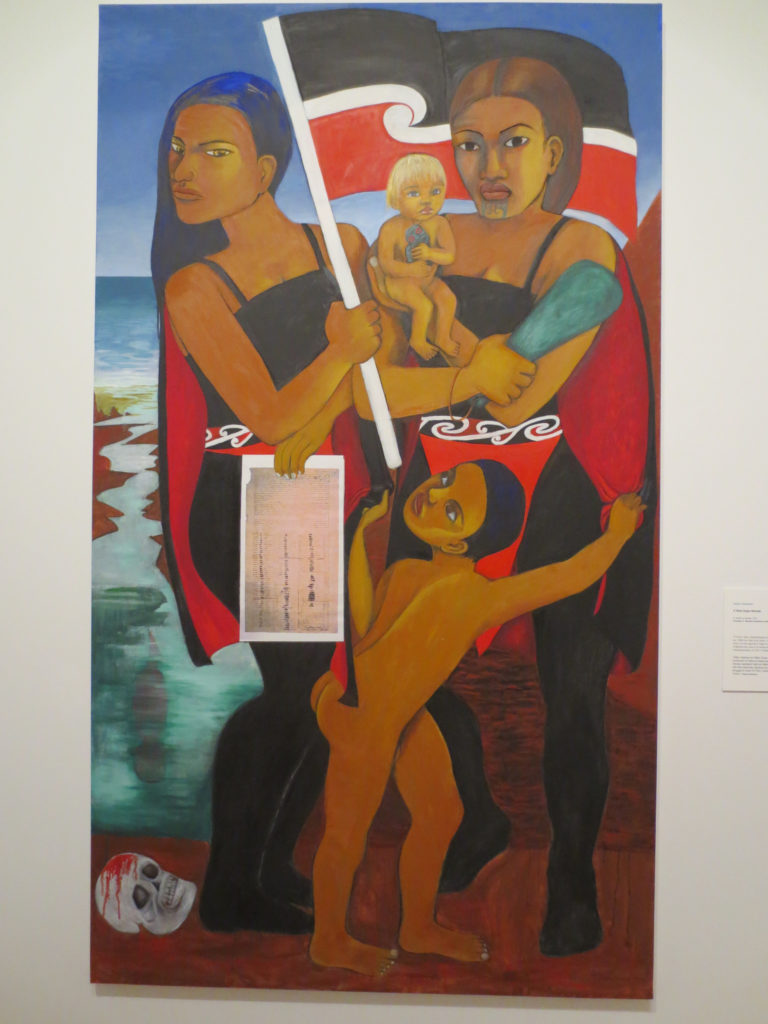A new study published in Transcultural Psychiatry considers how those in a Māori community understand experiences defined by Western psychiatry as “psychosis” and “schizophrenia.” Dr. Melissa Taitimu and Dr. John Read found that participants tended to hold “multiple explanatory models” which often included spiritual and cultural beliefs. Participants’ discussed their hesitance to share these perspectives in conventional health settings, for fear that they would be disregarded or pathologized. The authors maintain that the meaning individuals’ attribute to these experiences must be sensitively elicited and considered in assessment and care.
“Māori may hold both Māori and Pākehā (European) ways of understanding their experiences and meaningful recognition should be afforded to both throughout assessment and treatment planning in mental health services.”

As a result of colonization, Māori understandings of “schizophrenia” and “psychosis” have been influenced by Western psychiatry’s biomedical model. Taitimu and Read explain that research and clinical work has historically been “done upon Indigenous peoples by non-Indigenous researchers” using Western psychiatric constructs. Indigenous psychologies and research performed by and for community members have emerged in response to these oppressive practices. The current study, led by Māori researcher Dr. Melissa Taitimu, is an example of this work. Such approaches are intended to depathologize and empower Indigenous communities by emphasizing social, political, cultural, and spiritual influences on well-being.
The authors provide an overview of some fundamental concepts within mātauranga Māori (traditional Māori knowledge systems), while also acknowledging that mātauranga Māori cannot be tidily translated to fit within the margins of a Western scientific journal article. These knowledge systems may only be truly meaningful as they are lived and experienced within the Māori community. Nevertheless, Taitimu presents the following components of Māori philosophy:
- Tapu starts at one’s birth and represents the potential for what a being can become. Taitimu maintains that tapu is essential to understanding Māori well-being. Tapu also refers to the “laws of interaction” the preside over each being’s potential to relate to others powerfully. These laws can relate to “people, places, animals, food, plants, events, and relationships,” and can either represent a “permanent state” or be used to reestablish or preserve balance in specific situations.
- Mate Māori is a kind of Māori sickness that can result from “transgressions of tapu.”
- Pōrangi (literal translation is “dark night”) is a specific type of mate Māori that can be understood as a lapse into a state of darkness (Te Pō) depicted in Māori creation stories.
Taitimu outlines the harms that have come to Māori communities as a result of colonization, including legislation in the early 1900s that targeted traditional healers of mate Māori and imposed Western medicinal practices on the Māori. Presently, the Māori have worryingly high Western mental health services utilization rates. At the same time, there are signs that some local practitioners hold views that compromise their ability to provide competent care to Māori community members.
One study found that 11% of New Zealand psychiatrists surveyed believed that Māori are biologically prone to mental illness, and some shared outright racist remarks in their survey responses. Thus, with the Māori community’s guidance, Taitimu sought to address how these dynamics have affected the care and recovery of Māori who live with experiences of “psychosis.”
The goal of the study was to explore how Māori view experiences that are categorized as “schizophrenic” or “psychotic.” Taitimu conducted 57 semi-structured interviews with various Māori community members who had either had these experiences directly or work with these individuals, including Tangata whaiora (mental health service users), tohunga (traditional healers), kaumatua/kuia (elders), Māori clinicians, cultural support workers, and students. The research was designed and carried out in close consultation with the Māori community.
After analyzing the interview transcripts, the researchers found a number of key themes, some of which are included below:
- Various participants shared that experiences labeled as “psychotic,” such as hearing voices or seeing a person who is not there, are normal and should not be pathologized.
- “For me, hearing voices is like saying hello to your whānau [family] in the morning, and it is nothing unusual.” – Cultural Support Worker participant
- Some shared that so-called “psychotic” experiences could be viewed as a sign that an ancestor is trying to communicate with them.
- Some participants viewed these experiences as a “sign of giftedness,” or Matakite. This is considered to be a “spiritual gift.” Those imbued with this gift can see future events and be aware of happenings in other places.
- Others defined experiences of psychosis as being Mate Māori, the Māori illness described above, and thus a cause for concern.
- “When the wairua [spirit] goes wandering that is wairangi [a form of Mate Māori]. People are not their whole selves. They do not have the ability to communicate or fully function.” – Elder participant
The researchers found that participants largely viewed experiences of “psychosis” as being due to a Māori ailment (Mate Māori), a gift (Matakite) or a Pākehā disease (Western psychiatric illness), but that the borders between these explanations varied by participant, and depended on the experience’s content, control and context. For example, some interviewees thought that if the experience’s content was not distinctively Māori (e.g., containing Māori language, symbols, people, etc.), it was probably a “Pākehā illness.” Some felt that loss of control suggested the presence of illness. And some explained that if the person had been able to hear voices starting in childhood (i.e., context), it was likely a spiritual gift, not an illness.
Overall, participants were found to possess “multiple explanatory models” for experiences of “schizophrenia” and “psychosis.” The most common ways of understanding these experiences were spiritual and cultural in nature, although other explanations included psychosocial, biomedical, and historical trauma-related reasons. Many participants also noted that they were uneasy about disclosing their spiritual and cultural views in Western mental health settings out of concern that they would be brushed aside or pathologized.
“It is doubtful that the boundaries will ever be clear between what experiences are considered matakite, Mate Māori or schizophrenia/psychosis. Therefore, understanding personal meanings and cultural context will continue to play a pivotal role in determining the appropriate pathways for recovery on a case by case basis.”
The authors conclude that given Māori participants’ inclination towards multiple explanatory models, care within this community should integrate both clinical and cultural approaches. They argue that to be able to provide sensitive, responsive assessment and treatment, it is crucial to ask service users about how they view their experiences.
****
Taitimu, M., Read, J., & McIntosh, T. (2018). Ngā Whakāwhitinga (standing at the crossroads): How Māori understand what Western psychiatry calls “schizophrenia.” Transcultural Psychiatry, 1363461518757800. (Link)















“Many participants also noted that they were uneasy about disclosing their spiritual and cultural views in Western mental health settings out of concern that they would be brushed aside or pathologized.”
All should be weary of discussing religious or spiritual beliefs with today’s “mental health professionals” because they believe a dream query about what it means to be “moved by the Holy Spirit” is the same thing as a “Holy Spirit voice,” proving “psychosis.” Despite the reality that dreams aren’t “voices.”
Never discuss spiritual beliefs of any kind with today’s Western, material world only believing, every concern or dream query is proof of a “life long incurable genetic brain disease,” DSM deluded mental health professionals. They don’t believe in the Holy Spirit or anything spiritual existing, including God. And this includes the “mental health professionals” who fraudulently claim to be Christians or Jews.
Report comment
Religious beliefs can all be diagnosed as “mental illness” symptoms. So can creativity and a sense of humor.
2/3 of all psychiatrists are atheists. Aside from Laing I know of none who produced works of art. As a whole they are humorless and emotionally detached. Since they view themselves as perfectly sane they view religious people, artists, people who laugh and show empathy as Severely Mentally Ill.
Ailurophobia and collecting human brains for a hobby are signs of Sound Mental Health. Ask our good friend Dr. Torrey. 😀
Report comment
Understanding personal meaning and cultural context – what a concept! Who’d have ever thought that personal meaning and cultural context would be relevant in how someone thinks and feels? Sheesh…
Report comment
Participants’ discussed their hesitance to share these perspectives in conventional health settings, for fear that they would be disregarded or pathologized.
Like by having their experiences called “psychosis” albeit with quotes?
Report comment
Yeah, I wonder where they got the idea they might be disregarded or pathologized? Could it possibly be from being disregarded and pathologized?
Report comment
I began psychiatry in 1957 and found that by getting to know my patients and their lives it became evident that their symptoms were a result of previous traumata. Since we’d done this together it enabled the patients to make better sense of their lives, and well.
With psychotic patients the trauma was usually earlier and deeper, and required longer therapy, sometimes even bottle feeding to fill the void of nursing deprevation.
Since I discovered that patients could become healthy and well, I would agree that mental illnesses are psychological and spiritual in origin, and usually do better with human help rather than with toxic drugs.
Report comment
Really interesting to read it :3
Report comment